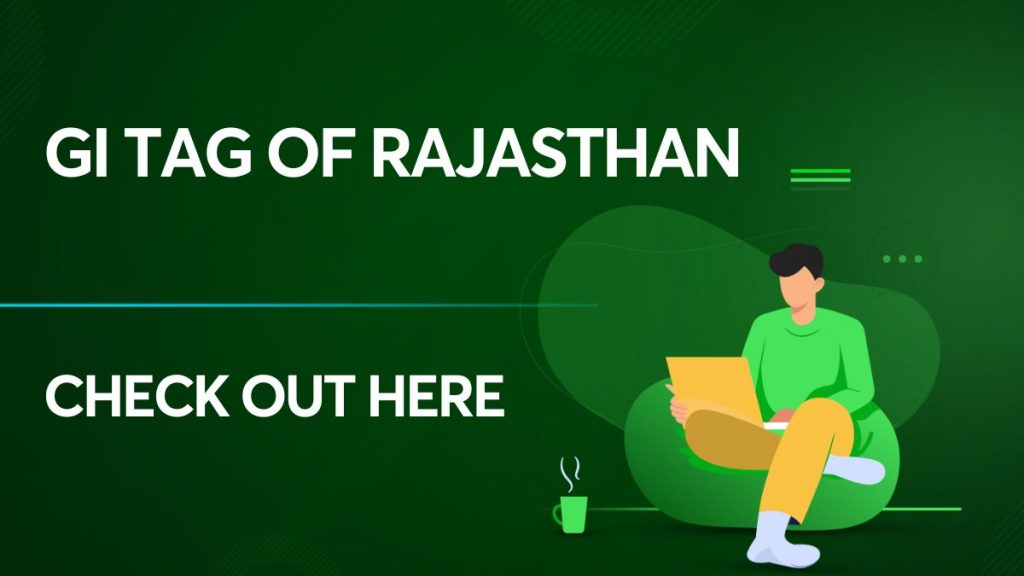Rajasthan, a state in northern India, is renowned for its rich cultural heritage and traditional handicrafts. Over the years, several products from Rajasthan have gained national and international recognition for their unique qualities and cultural significance. To protect the intellectual property rights of these products and promote their economic interests, the Government of India has granted Geographical Indication (GI) tags to several products from Rajasthan. A GI tag is a certification that identifies a product as originating from a specific geographic region and possessing qualities or characteristics that are unique to that region. In this article, we will explore some of the products from Rajasthan that have been granted GI tags and examine their cultural and economic significance.
GI Tag of Rajasthan and its Importance
The Geographical Indication (GI) tag is a certification that identifies a product as originating from a specific geographic region and possessing qualities or characteristics that are unique to that region. Rajasthan, a state in northern India, has several products that have been granted GI tags, such as Kota Doria, Bikaneri Bhujia, Jaipur Blue Pottery, Sanganeri Hand Block Printing, Molela Clay Work, Kathputlis of Rajasthan, and Marwar Mega Food Park Basmati Rice.
The importance of GI tags for Rajasthan’s products lies in their ability to protect the intellectual property rights of the producers and promote the economic interests of the region. A GI tag helps to prevent unauthorized use of a product’s name or reputation by producers outside the region, thereby safeguarding the product’s cultural heritage and unique qualities. It also provides an assurance of quality and authenticity to consumers, thereby creating a market demand for the product and supporting the livelihoods of local producers.
Furthermore, GI tags help to promote the region’s tourism industry by highlighting its unique cultural heritage and traditional handicrafts. It can also help to create jobs and opportunities for local artisans, thereby contributing to the socio-economic development of the region.
Check the latest updates below-
List of GI Tag of Rajasthan
Here’s a list of the products from Rajasthan that have been granted GI tags:
| S.No. | GI Tag | Description |
| 1. | Bagru Hand Block Printing | Handicraft |
| 2. | Blue Pottery of Jaipur | Handicraft |
| 3. | Blue Pottery of Jaipur Logo | Handicraft |
| 4. | Kathputli of Rajasthan | Handicraft |
| 5. | Kathputali of Rajasthan Logo | Handicraft |
| 6. | Kota Doria | Handicraft |
| 7. | Kota Doria Logo | Handicraft |
| 8. | Molela Clay Work | Handicraft |
| 9. | Molela Clay Work of Rajasthan Logo | Handicraft |
| 10. | Phulkari | Handicraft |
| 11. | Pokaran Pottery | Handicraft |
| 12. | Sanganeri Hand Block Printing | Handicraft |
| 13. | Thewa Art Work | Handicraft |
| 14. | Bikaneri Bhujia | Food Stuff |
| 15. | Makrana Marble | Natural Goods |
| 16. | Sojat Mehndi | Natural Goods |
Recent GI Tag of Rajasthan
Rajasthan, often known as “The Land of Kings,” is an Indian state that was founded on March 30, 1949, when Rajputana came into the Dominion of India. It is India’s largest state, including its capital city, Jaipur, often known as the “Pink City.” Rajasthan is home to 15 Geographical Indication (GI) Tags. On May 18, 2018, “Pokaran Pottery” received the last GI tag.
Pokaran Pottery is a handmade product for which M/s. Kumbhkar Hasthkala Vikas Samiti applied for a GI tag on January 19, 2015. Pokaran (sometimes spelled Pokharan) is a city and municipality in the Jaisalmer region of Rajasthan, surrounded by rocky, sandy, and five salt hills. It was the location of India’s first underground nuclear bomb detonation. Pokaran’s soil is dense and pale pink, making it perfect for ceramics. The pottery of Pokaran is distinguished from other terracotta pottery by its unique environment and soil.
Each Pokaran Pottery product displays a different theme. Hand-painted plant pots, large decorative vases, terracotta clay planters, handmade flower pots, statues, utility wares such as cooking and serving pots, paraat, kulhars, chanti, gullak, and tawa have a strong market demand in both rural and urban areas.
FAQs on GI Tag of Rajasthan
Rajasthan is home to 16 Geographical Indication (GI) Tags.
Kota Doria is a traditional fabric made of cotton and silk fibers that originated in Kota, Rajasthan. It is known for its fine texture, transparency, and durability.
GI tags provide legal protection to the products, ensuring that they cannot be duplicated or sold under false pretenses. This helps to promote the state’s cultural heritage, support the livelihoods of local artisans and farmers, and boost the state’s economy.
Sanganeri Hand Block Printing is a traditional printing technique that originated in Sanganer, Rajasthan. It involves the use of wooden blocks to print intricate designs on fabrics, typically using natural dyes.
Thewa Art of Pratapgarh is a traditional art form that involves the creation of intricately designed jewelry using a combination of gold and colored glass.
